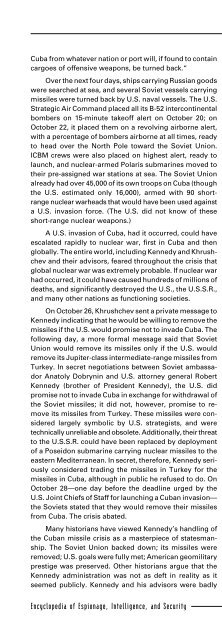ENCYCLOPEDIA OF Espionage, Intelligence, and Security Volume ...
ENCYCLOPEDIA OF Espionage, Intelligence, and Security Volume ...
ENCYCLOPEDIA OF Espionage, Intelligence, and Security Volume ...
Create successful ePaper yourself
Turn your PDF publications into a flip-book with our unique Google optimized e-Paper software.
Culper RingCuba from whatever nation or port will, if found to containcargoes of offensive weapons, be turned back.“Over the next four days, ships carrying Russian goodswere searched at sea, <strong>and</strong> several Soviet vessels carryingmissiles were turned back by U.S. naval vessels. The U.S.Strategic Air Comm<strong>and</strong> placed all its B-52 intercontinentalbombers on 15-minute takeoff alert on October 20; onOctober 22, it placed them on a revolving airborne alert,with a percentage of bombers airborne at all times, readyto head over the North Pole toward the Soviet Union.ICBM crews were also placed on highest alert, ready tolaunch, <strong>and</strong> nuclear-armed Polaris submarines moved totheir pre-assigned war stations at sea. The Soviet Unionalready had over 45,000 of its own troops on Cuba (thoughthe U.S. estimated only 16,000), armed with 90 shortrangenuclear warheads that would have been used againsta U.S. invasion force. (The U.S. did not know of theseshort-range nuclear weapons.)A U.S. invasion of Cuba, had it occurred, could haveescalated rapidly to nuclear war, first in Cuba <strong>and</strong> thenglobally. The entire world, including Kennedy <strong>and</strong> Khrushchev<strong>and</strong> their advisors, feared throughout the crisis thatglobal nuclear war was extremely probable. If nuclear warhad occurred, it could have caused hundreds of millions ofdeaths, <strong>and</strong> significantly destroyed the U.S., the U.S.S.R.,<strong>and</strong> many other nations as functioning societies.On October 26, Khrushchev sent a private message toKennedy indicating that he would be willing to remove themissiles if the U.S. would promise not to invade Cuba. Thefollowing day, a more formal message said that SovietUnion would remove its missiles only if the U.S. wouldremove its Jupiter-class intermediate-range missiles fromTurkey. In secret negotiations between Soviet ambassadorAnatoly Dobrynin <strong>and</strong> U.S. attorney general RobertKennedy (brother of President Kennedy), the U.S. didpromise not to invade Cuba in exchange for withdrawal ofthe Soviet missiles; it did not, however, promise to removeits missiles from Turkey. These missiles were consideredlargely symbolic by U.S. strategists, <strong>and</strong> weretechnically unreliable <strong>and</strong> obsolete. Additionally, their threatto the U.S.S.R. could have been replaced by deploymentof a Poseidon submarine carrying nuclear missiles to theeastern Mediterranean. In secret, therefore, Kennedy seriouslyconsidered trading the missiles in Turkey for themissiles in Cuba, although in public he refused to do. OnOctober 28—one day before the deadline urged by theU.S. Joint Chiefs of Staff for launching a Cuban invasion—the Soviets stated that they would remove their missilesfrom Cuba. The crisis abated.Many historians have viewed Kennedy’s h<strong>and</strong>ling ofthe Cuban missile crisis as a masterpiece of statesmanship.The Soviet Union backed down; its missiles wereremoved; U.S. goals were fully met; American geomilitaryprestige was preserved. Other historians argue that theKennedy administration was not as deft in reality as itseemed publicly. Kennedy <strong>and</strong> his advisors were badlyEncyclopedia of <strong>Espionage</strong>, <strong>Intelligence</strong>, <strong>and</strong> <strong>Security</strong>frightened; Secretary of State Dean Rusk began to weepwhen told, at the height of the crisis, that a U-2 plane hadbeen shot down over Cuba. Robert Kennedy said later thathis brother had put events in motion that he could notcontrol.What is certain is that Khrushchev <strong>and</strong> Kennedy wereboth willing to risk global nuclear war for dubious gains.The Soviets were soon to achieve strategic nuclear paritywith the U.S. simply by building more <strong>and</strong> better ICBMs;any strategic advantage to be gained by placing missilesin Cuba would, therefore, be short-term. By the sametoken, no long-term U.S. interests were at stake in thedeployment of Soviet intermediate-range missiles to Cuba,as within a few years every city in the continental U.S.would be vulnerable to Soviet ICBMs <strong>and</strong> submarinelaunchedballistic missiles anyway. Kennedy administrationofficials knew that the Soviet buildup in Cuba would,at worst, decrease the United States’s massive strategicadvantage, or appear to do so—in Kennedy’s words, makethe Soviets ”look like they’re coequal with the U.S.“ Kennedywas thus, willing to gamble the world’s future not tosave the U.S. from an imminent military threat, but becauseto tolerate the Soviet buildup in Cuba would, in hiswords, ”have politically changed the balance of power. Itwould have appeared to, <strong>and</strong> appearances contribute toreality.“The U.S. emerged from the Cuban missile crisis withgreatly exp<strong>and</strong>ed confidence in its own geopolitical skill.Its policymakers had verified, as they believed, that ”showingresolve“ (threatening to use military force) was moreeffective than diplomacy, the United Nations, or internationallaw—with the proviso that the U.S. should be morewilling to commit conventional (non-nuclear) military forcesin a crisis, in order to keep back from the nuclear abyss.Today, many historians argue that U.S. willingness toinvade Vietnam is directly attributable to its success duringthe Cuban missile crisis.❚ FURTHER READING:BOOKS:Nathan, James. Anatomy of the Cuban Missile Crisis.Westport, CT: Greenwood Press. 2001.PERIODICALS:Frankel, Max. ”Learning from the Missile Crisis.“ Smithsonian.October, 2002: 53–64.SEE ALSOBay of PigsCulper Ring.SEE Revolutionary War, <strong>Espionage</strong> <strong>and</strong> <strong>Intelligence</strong>.295







![The Big Lie 9-11 and Government Complicity in Mass Murder [PDF]](https://img.yumpu.com/50957077/1/190x245/the-big-lie-9-11-and-government-complicity-in-mass-murder-pdf.jpg?quality=85)








